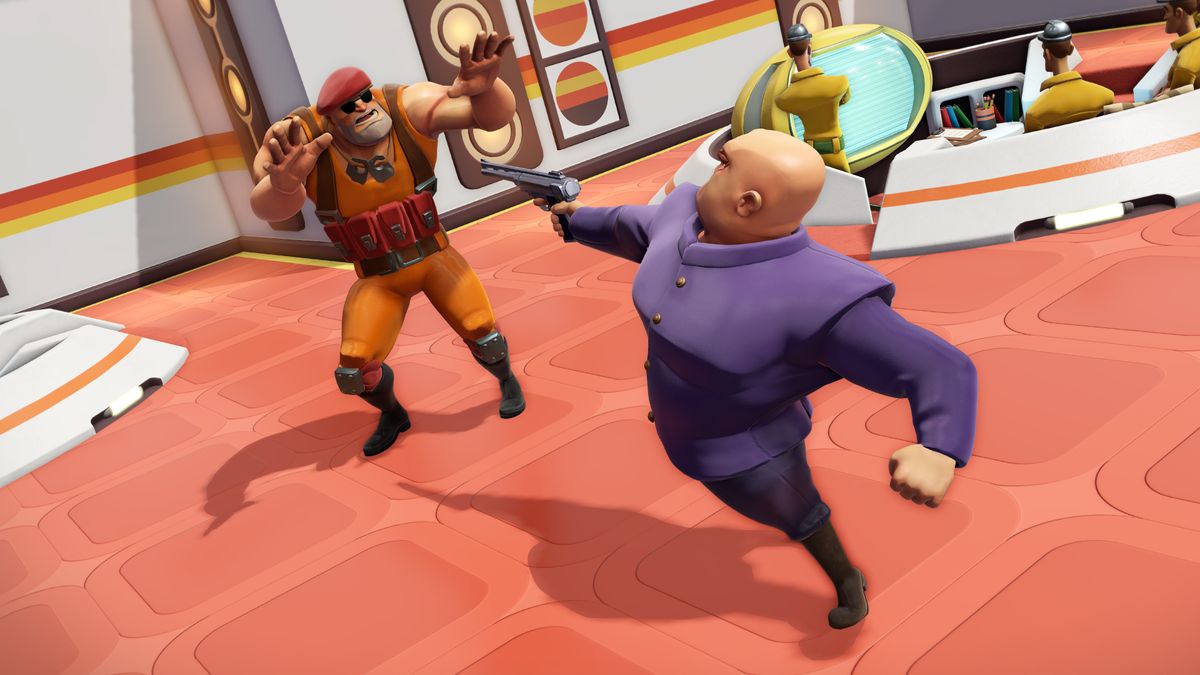Our Verdict
A superbly stylish and surprisingly challenging management game, Evil Genius 2 is let down only by its tendency to bloviate.
PC Gamer's got your back
What is it? A management game about all things villainous.
Expect to pay $40/£35
Release March 30, 2021
Developer Rebellion
Publisher Rebellion
Reviewed on AMD Ryzen 5 3600, Nvidia GeForce 2080 Super, 32 GB RAM
Multiplayer? No
Link Official site
Thanks to Evil Genius 2, I now understand why so many criminal masterminds are bald. It's because they've torn all their hair out through sheer frustration. When a James Bond knockoff rocks up to your secret lair and murders a bunch of henchmen with an exploding cufflink or whatever, that's all well and good for the henchmen, who are now on a permanent lunch hour, but nobody considers the administrative headache it causes for the boss.
Now you've got to train new henchmen to replace the old ones, which means dipping into your pool of workers and sending them to the equivalent of Thug University. This in turn means hiring more workers, which costs money you don't have because you spent it all on replacing all the traps that double-not-seven also broke. This means spinning more moneymaking schemes, which cost yet more henchmen to set in motion, thus starting the whole cycle over again.
Being a master villain is one big headache for your big bald braincase, and it's this villainous bureaucracy that Evil Genius 2 replicates. Mostly for the better, but sometimes for the worse. When all's said and done, it's a fine management title that balances brilliantly presented base-building with some genuinely challenging plate-spinning. But thank goodness it features a mechanic that lets you randomly shoot your minions, because otherwise at times I might have ripped my own skull out and thrown it at the screen.

Placing you in the role of one of several cackling megalomaniacs, Evil Genius 2 sees you constructing a secret lair on a volcanic island out in the Pacific, then using that lair to sow chaos through the world. You'll construct rooms to service both your minions' needs and your dastardly desires, recruit various types of underling to help realise your nefarious plans, lay traps and obstacles to bamboozle enemy Agents, and ultimately construct a terrifying Doomsday Device to make the world bend the knee.
This starts with a base-building bonanza. Unlike Dungeon Keeper or Two Point Hospital, which mete out the different rooms you can build across multiple levels within the game, Evil Genius 2 more or less lets you build all of its rooms at once. From barracks for your minions through cafeterias and training areas, all the way up to your Genius' gold-plated Inner Sanctum, you'll have the basic layout of your base established within the first five hours.
This part of Evil Genius 2 is pure entertainment, not least because the base-building both looks and feels superb. Like Two Point Hospital, Evil Genius boasts a vibrant, knockabout cartoon style—it's less Aardman, but still bears some resemblance to the original and considerably craggier Evil Genius. Your minions mine out rooms with bulky, underslung laser cannons, then use those same cannons to put objects and furniture into rooms, which fall into place with a mighty whomp.
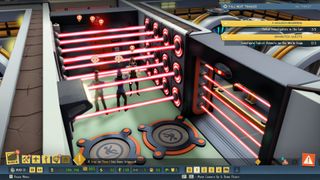
But the real treat here is the animation, which is both meticulous in its detail and delightfully comic. I love the way guards lumber through corridors, clad in red spandex like an evil Mr Incredible, a stark contrast to the superior, stiff-backed stroll of your Scientists. But the highlight of Rebellion's animation work is found in your interrogation room, where your minions torture captured agents by tickling their feet or dropping sticks of fake dynamite into their laps.
It's a fantastic game to watch in motion, which is as well because after this feast of construction comes something of a fallow patch. Once you've built your Inner Sanctum, Evil Genius 2 falls into a holding pattern as your scientists slowly research new traps, upgrades and room objects, while you begin to grapple with your ultimate goal of world domination.
The emphasis switches to two activities, expanding your criminal network across the globe and defending your base from enemy agents. The former involves dispatching groups of minions to establish relay stations in different areas of the world. Each of these provides a small amount of residual income, while also unlocking Schemes, which pull in larger chunks of income.

Schemes bring in much-needed cash, but minions dispatched on them don't come back, while schemes also generate Heat. This ultimately leads to the various world governments dispatching agents to investigate and sabotage your lair. Initially, these are incompetent private detectives who wouldn't know a secret lair if it erupted in their face. But over time, the agents become more numerous and more capable, including Super Agents like Agent X and Britain's number-one spy John Steele, who can waltz through your security infuriatingly easily.
The real treat here is the animation, which is both meticulous in its detail and delightfully comic
Unwelcome snoops can be dealt with in various ways. In proud Evil Genius tradition, you have a range of eclectic traps to deploy, ranging from freeze rays and giant fans to searing laser grids and shark-infested plunge-pools. Should these fail, you can set the base to High Alert, whereupon your minions will descend upon enemy agents and clobber them into submission.
My favourite way to deal with Agents, however, is to distract them with the Cover Operation, a glittering Casino front complete with cocktail bars, baccarat tables, stage shows, and much more. Watching a spy get fleeced at one of your roulette tables and head home even more empty handed than when he arrived is incredibly satisfying.
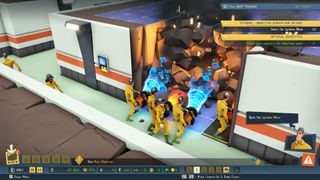
All of this is enjoyable to grapple with, but there's inescapably a somewhat empty-feeling to Evil Genius 2's middle game. Part of the problem is that the missions you must complete to progress are extremely long-winded. Each has four or five sub-objectives to complete, some of which involve completing multiple "side-stories" that themselves have four or five sub-objectives to complete.
These long and complex chains of objectives make it easy for the simulation to creep in and obstruct your progress. Alongside money, there are a bunch of different resources you need to manage like Broadcast Strength needed for expanding and upgrading your criminal network, and Intel, required for starting higher-level missions. Meanwhile, if a base station in a region hits max Heat level, that region locks down. If a mission is in progress when lockdown hits, it's cancelled and you have to restart.
What doesn't help is that the missions are not always that engaging. They have cool concepts, like kidnapping rival Crime Bosses or stealing the Declaration of Independence, but most of the action happens off-screen. Meanwhile, the cutscenes that bookend objectives are let down by some iffy voice performances. The Geniuses are all superbly acted, as you'd expect when Rebellion has sourced voice talent such as Brian Blessed, but the minions and subordinates are stilted and unconvincing, which has the effect of your geniuses basically shouting at mannequins.
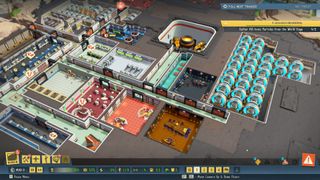
The result was a good few hours where I spent most of my time waiting. Waiting for a new technology to unlock. Waiting for my helicopter to transport minions to a mission site. Waiting to accrue enough money to dig a new room through "hard rock", which is disproportionately more expensive to mine through than regular rock. Everything takes too long to resolve, and there's not enough going on to occupy your time during these periods. There is a fast-forward function, of course, but using this is risky, as you might miss an Agent sneaking into your base, or a region with an ongoing mission slipping into lockdown.
When Evil Genius 2 is on form, it's one of the best management games out there
This problem never quite goes away, but it does become less acute once you start working on your Doomsday Device. At this point, you've unlocked enough new items and accrued enough funds that your base needs considerable expansion. Enemy Agents become more numerous and more challenging, including one who waltzed through my security and blew up half of my communications network. Your minions become more diversified, and you unlock more lucrative missions on the World Map, making it easier to manage Heat levels and providing more space to tinker with your base while other stuff is going on.
When Evil Genius 2 is on form, it's one of the best management games out there. Not only is it imaginative and fun, it's also genuinely challenging. Trying to juggle your finances while monitoring the world to negate Heat Lockdowns, while also fighting literal fires as an Agent stalks through your corridors, disguised so he's invisible to everyone but you, is super engaging. There are also some other cool features that I haven't yet mentioned, like how you can recruit rival crime bosses to become your henchmen, but only after thoroughly putting them in their place first. You can also brainwash enemy agents and turn them into minions, while minions that are dissatisfied with their lot may attempt to desert your lair.
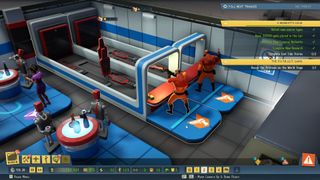
But there's no getting away from the fact that the game's feedback loops are too stretched out. It feels it could offer a tight 20-hour game—more than enough considering there are four different Geniuses to play as. But this is stretched to 30 or 40 hours by overlong missions and a whole lot of waiting for stuff to happen.
Despite taking a roundabout route to get there, however, in the end I think Evil Genius 2 successfully replicates the cat-stroking, moustache-twirling, mad-cackling fun of being a calculating supervillain. On the scale of criminal masterminds, I'd rate it a Dr Evil. It's funny and it's got all the right equipment, but it's not quite the full Blofeld.
A superbly stylish and surprisingly challenging management game, Evil Genius 2 is let down only by its tendency to bloviate.

Former Stalker dev reveals new FPS set in a post-apocalyptic Paris that's been overrun by sentient trees

Terraria creator jokes that the 1.4.5 update may not be the last one after all: 'Terraria will never die as long as there is one last final update'

Black holes, buildings on poles, and a 'sea urchin planet': PUBG creator's world-sized tech demo may be hiding some bizarre machine learning 'hallucinations'
